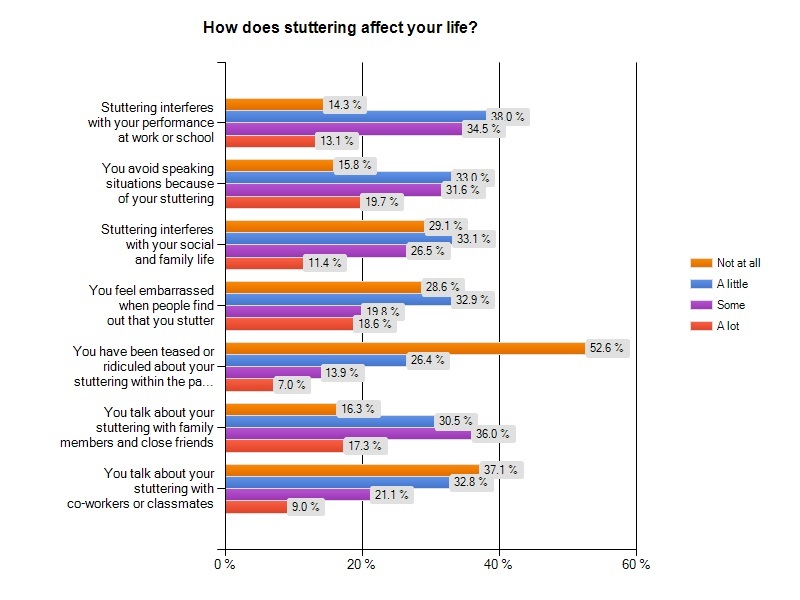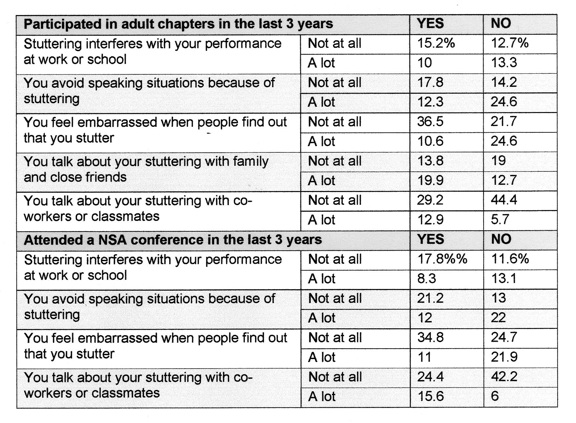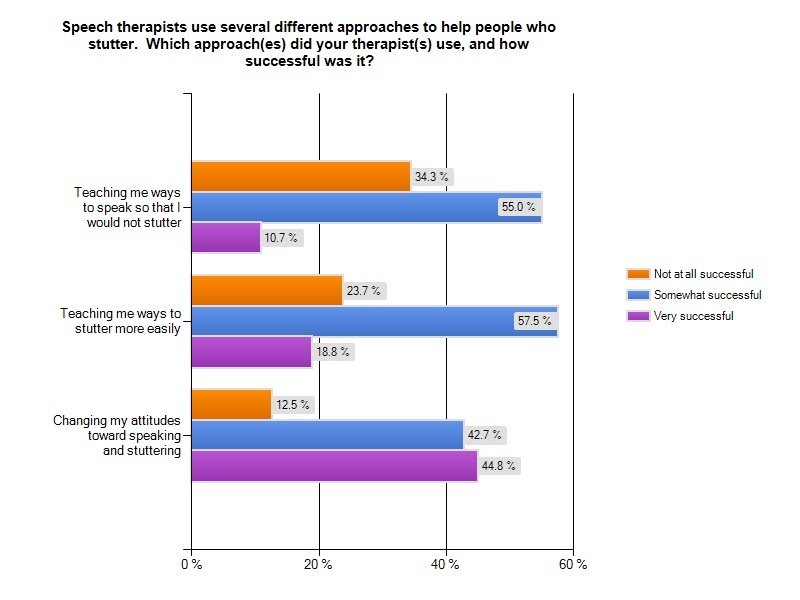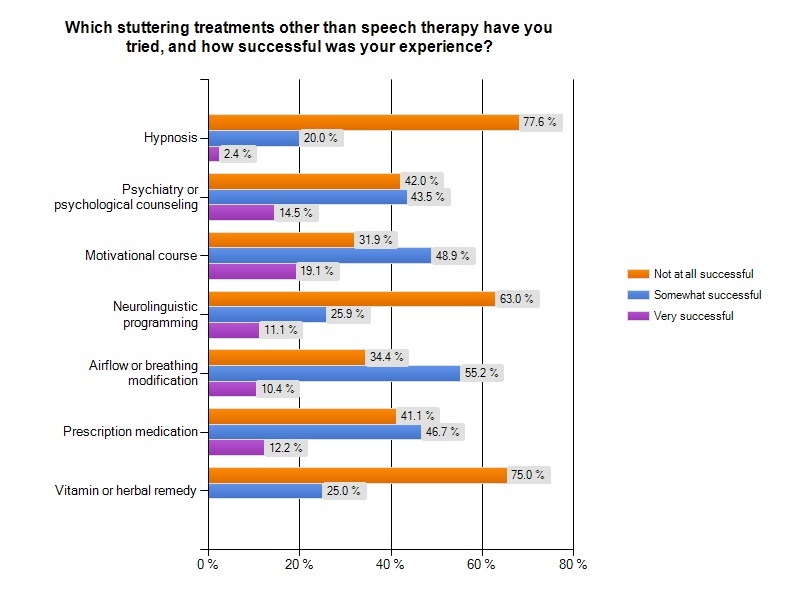The Experience of People Who Stutter: A Survey by the National Stuttering Association
 |
About the presenter: Jim McClure is a person who stutters, a member of the National Stuttering Association's board of directors and the consumer representative on the Specialty Board on Fluency Disorders. He was a NSA chapter leader in Chicago for many years before relocating to Albuquerque, New Mexico. Jim is a public relations consultant with a background in market research, and is a retired U.S. Navy public affairs officer. |
The Experience of People Who Stutter: A Survey by the National Stuttering Association
by Jim McClure
from New Mexico, USA
Speech therapy helps most people who stutter, and does so to a greater extent than alternative treatments and assistive devices. Clinician qualifications make a difference in therapy effectiveness. Participation in support groups alleviates the life impact of stuttering and makes success in speech therapy more likely.
These were among the key findings of a survey conducted by the National Stuttering Association (NSA) in May 2009 to gather information about stuttering from the perspective of people who stutter. 1,235 people responded to the survey, including 686 adults and 31 teens who stutter, 164 parents of children who stutter and 354 speech-language pathologists.
Life impact of stuttering
Stuttering interferes with work, school and family life. Children and adults who stutter often avoid speaking situations, feel embarrassed when people find out they stutter, and do not discuss their stuttering with family, friends and co-workers.
Four out of 10 adults say they have been denied a job, promotion or school opportunity because of their stuttering. Other findings for adults and teens:

Data on these questions were similar for children who stutter.
- Eight out of 10 parents say stuttering interferes with schoolwork, and that their children avoid speaking situations.
- 75% say stuttering interferes with family and social life, and 85% say their children are embarrassed about stuttering.
- One difference between children and adults is that more than 8 out of 10 children have been bullied or teased about stuttering.
Stuttering support activities can help people come to terms with stuttering
Stuttering support activities such as the National Stuttering Association's local support groups and national conference help people build their self-confidence and deal with the emotional side of stuttering.
The survey found a significant difference in the life impact of stuttering on adults who are active participants in the NSA: They are less likely to avoid speaking situations and less likely to say their stuttering interferes with work or school. They also are more likely to talk about stuttering with family members, friends and co-workers.
Since all respondents to the survey had some connection to the NSA - as a paid member, participant, former member/participant or web site registrant - we compared those who were active participants in the last three years to those who were not. The NSA made the same comparison in a 2002 survey of paid members and found comparable significant differences between active participants and inactive members.

71% of respondents have attended stuttering support groups (including local support groups and therapy continuation groups led by speech therapists) and about half currently attend local NSA chapters. The majority of those who have attended NSA chapters or the NSA national conference say the experience has been very helpful in improving their self-confidence, practicing speaking, learning more about stuttering and exploring attitudes toward speaking and stuttering. Nearly all would recommend support groups to others.
Speech therapy is generally successful
Speech therapy is the primary treatment for stuttering. While most survey respondents consider their speech therapy somewhat successful, results vary.
- 90% of the adults and teens surveyed have had speech therapy and 69% have had therapy as adults.
- 87% have had speech therapy more than once, and 35% have had speech therapy five or more times.
The survey did not attempt to define speech therapy success, but instead relied on respondents' perceptions. Some respondents may have considered their therapy unsuccessful unless they achieved perfectly fluent speech; others may value gains in self-confidence more than fluency.
Most adults, teens and children have had better success with speech therapy from university speech clinics, private-practice clinicians and intensive programs than with the therapy they received in school. Teens reported higher rates of success than adults in school-based therapy and with private clinicians. More than half of parents reported that their child's speech therapy in grade school, middle school and high school was at least somewhat successful, though more than one-third considered this therapy not at all successful.
Speech therapy is not "one size fits all." Speech therapists use different approaches to treat stuttering and often combine several methods to meet individual needs. In general, survey respondents considered therapies that change attitudes toward speaking and stuttering to be more successful than therapies that focus primarily on speech mechanics. The following table reflects findings for adults and teens, but parents reported similar findings for children.

While attitude-changing therapies appear to have a higher success rate, it's important to note that all three approaches were considered at least somewhat successful by the majority of respondents. Attitude change also may be more durable than fluency skills: 84% of adults and teens reported experiencing a relapse after improving their fluency in therapy.
Clinician qualifications make a difference
One challenge for people who stutter is that most speech-language pathologists have limited training and experience in treating stuttering. About one-third of adult and teen respondents and 46% of children had speech therapy from Board Recognized Specialists in Fluency Disorders: clinicians who specialize in stuttering. Adults and teens who worked with a specialist are:
- More likely to have had speech therapy as an adult;
- More likely to have had a successful therapy experience with a private clinician or intensive program;
- More likely to have attended a stuttering support group.
Children whose clinician was a specialist are:
- Significantly less likely to avoid speaking situations
- Significantly less likely to find that stuttering interferes with social and family life
- Significantly less likely to be embarrassed about stuttering
- More likely to have had a successful therapy experience
Issues for parents
Most parents have been involved with their children's speech therapy. However, "homework" assignments to practice speaking techniques can be a source of friction between parents and kids. About half of parents say their children have discontinued speech therapy at some point.
Nearly 30 percent of parents were advised by professionals to postpone speech therapy until their children were older - despite a consensus among experts that early intervention is critical. This faulty advice most often came from pediatricians and physicians, but nearly as often came from speech therapists.
14% said their child had been denied speech therapy in school. Verbatim comments indicated that in some cases, this was because a private school did not offer speech therapy, but some parents reported that the school did not have a clinician willing to treat stuttering.
Synergy between stuttering support and speech therapy
There is a positive correlation between stuttering support and speech therapy success. Adults who are active participants in NSA conferences and local chapters are more likely to:
- Have had speech therapy as an adult;
- Have had therapy with a Board Recognized Specialists in Fluency Disorders
Adults who participate in NSA chapters are more likely to consider their speech therapy successful in two of the three basic approaches to therapy:
- "Changing my attitudes toward speaking and stuttering" was considered very successful by 52% of chapter attendees vs. 35% of non-attendees;
- "Teaching me ways to stutter more easily" was considered very successful by 21% of chapter attendees vs. 15% of non-attendees.
The correlation between support activities and successful speech therapy works in both directions: Some NSA members participate in support activities and then seek speech therapy from a qualified clinician; others undertake speech therapy and then are referred to support activities by their clinicians. About half of speech-language pathologists who are affiliated with the NSA say they have referred clients to the organization's local chapters and annual conference. People who participate in support activities also learn about stuttering treatment options and are better equipped to choose a qualified clinician.
Alternative treatments are generally less successful than speech therapy
One-third of adult and teen respondents had had treatment other than speech therapy for stuttering. While some respondents had a measure of success with some treatments, none approached the success rate of speech therapy.

About one-quarter of parents said their children had tried alternative treatments, with results similar to those reported by adults.
Mixed results for assistive devices
A small percentage of adults (73 people) have used assistive devices such as the SpeechEasy, Fluency Master and Edinburgh Masker.
- 66.7% used the device less than one year.
- 45% had speech therapy in connection with their use of the device. Those who did were more likely to find the device somewhat successful in managing their stuttering.
- 75% currently use their device rarely or never.
Of these, 11% say the device was very successful in managing their stuttering but 52% say it was not at all successful. There was little difference in success rates between the three most popular devices.
How the survey was conducted
The National Stuttering Association's large membership enables the organization to survey a larger population of people who stutter than academic researchers can. The NSA works closely with leading speech-language pathologists and researchers but, as a consumer organization, does not endorse any specific treatment method.
The survey was conducted online on the SurveyMonkey.com web site. Invitations to participate in the survey were emailed beginning May 11, 2009, to the NSA's database of approximately 8,000 people, which includes registered web site visitors as well as members. Two follow-up emails were sent, and the survey was promoted on the NSA web site and NSA-sponsored Yahoo email groups.
The 1,235 respondents included 851 who identified themselves as NSA members, former members, or participants in NSA activities: representing about 40% of this core group. 467 respondents identified themselves as paid members, representing 50% of the NSA's sustaining membership. Since the survey covered only people who were associated with the NSA or who had visited the organization's web site, it is not representative of all the estimated 3 million Americans who stutter.
The survey was conducted by James A. McClure, APR, Fellow PRSA, a public relations consultant and former opinion research director at Illinois Bell Telephone, Richard D'Amico, brand strategist and research director of the EGC Group advertising agency, and John Tetnowski, Ph.D., CCC-SLP, professor of communication disorders at the University of Louisiana at Lafayette. The questionnaire was reviewed by the NSA's research committee.
The questionnaire was based on a mailed-questionnaire survey conducted by the NSA in 2002 with 710 respondents. Where the same questions were used, the findings of this survey are consistent with the 2002 survey.
SUBMITTED: August 23, 2009

